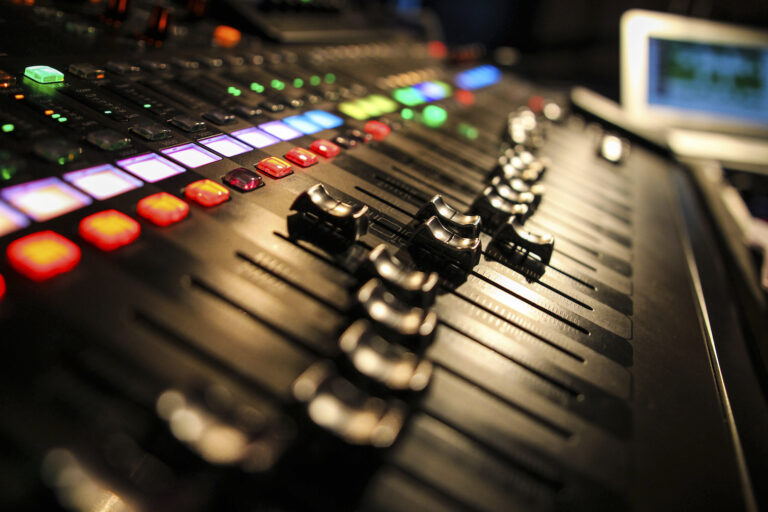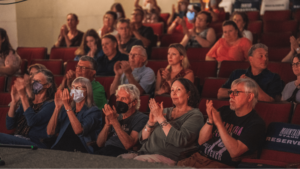Audio Visual is an area of event planning that doesn’t get written about that often. But while screens and sound systems might not be as compelling as catering and content, if you don’t get them right it can adversely affect your event in a big way.

Rob Morrison
Eventbrite asked Rob Morrison from Saville Audio Visual Conference & Live Events, one of the UK’s most experienced production companies, how event planners can avoid common pitfalls and deliver their messages loud and clear.
How does an event organiser begin to assess what AV equipment they require for their event?
Often it’s determined by audience numbers. Say you have a room with 300 people in a theatre style setting, we can work out from our CAD guys the best set design taking into account sight lines and the distance the audience is from the stage, whether it’s twin screen, single screen or a big LED screen backdrop.
We’ll assess the light levels, whether we have to do rear projection or front projection or perhaps LED is the only option because there isn’t much room to put in equipment. Then we look at distributing the sound around that room to ensure there are no dead spots and everyone can hear clearly.
We also look at the event content as well. Sometimes we have clients who have a huge room with lots of people but they’re not actually presenting any slides. They might say they want a big screen to put up a holding slide with a logo and we’ll say, “Okay, well we can print that and save you £15,000 on a massive projector and set, or we can think about raising the engagement and running some content – let’s discuss.”
We’re big advocates of making sure our clients are getting the best out of their events. We did an event the other week and the client seemed rather blasé about the audio system they wanted. We asked who she had presenting and she said it was the CEO of a major global company. We said, “Okay, what we’re going to do is upgrade the system spec because if you’re investing that sort of money into the highest paid CEO in the UK you’ll want to make sure all of your audience can hear really well.”
Is it necessary to spend lots of money on event AV?
With some venues there isn’t much you can do other than a low-level of AV tech. A great example is the top of the Gherkin. We’ve done hundreds of events in that space but the main requirement is often just a two speaker PA, some uplighters and maybe a screen.
What we try to do here at Saville is set the priorities with the technology that’s required because often a client is very assumptive on quality, particularly when they go into a venue that has some technology in the room and they just want to add to it.
Having some sort of budget expectation on technology is great. Event planners know how much the venue is going to cost, how much the catering and logistics are going to cost but the actual event technology and event support is a little bit of a grey area. You can deliver an event with a venue’s in-house kit or you can spend thousands of pounds supplementing it. It depends on what the expectations are.
What are the most common mistakes people make with their event AV?
Leaving it to the last minute is one of the biggest mistakes. It makes everyone a bit more panicky. And assuming what you’re buying from a tenancy point of view, say in a hotel, will serve the needs of the event. You’re dealing with a sales exec who wants to sell the venue.
We often site survey venues and we make a huge record of those so we know exactly what’s been installed. We can get the tech list from the venue and see the capabilities pretty quickly and also the position of kit. If there’s a projector and it’s stuck in the ceiling in a fixed position, is it pointing in the right direction? Is there only one and we need two?
If our client wishes us to do a site survey on their behalf, even if it’s only for us to say, “You’ve got it covered and you don’t need us at all,” then we’re very happy to do it.
Is it important to have a technician on-site to manage your AV on the day?
There’s dry hire and there’s wet hire; it’s whether you’re looking for a ‘drop and go’ scenario or you want someone to manage the whole technical aspect of the event. We always encourage our clients to have someone operating the equipment. It’s one less thing for them to do and also it makes it our responsibility.
Clients trust us to deliver technology and the last thing you want is a phone call last thing at night with someone saying, “I can’t patch in this microphone.” It may be that they just hired a bit of kit to complement their existing equipment, but still if they’re not used to using that brand then suddenly you’ve got to work out how to do it. It’s just another thing for them to worry about.
How far in advance should an event organiser arrange AV equipment?
We have clients already planning events for next year and also clients who rang yesterday for an event today! The ideal is hard to define because you really want to know the shape and scale of the event. We’ve delivered events worth thousands of pounds within two weeks, but we’ve also done £500 events the same day. A lovely lead-time would be about a month, but at the moment it’s often much less than that!
How does one go about choosing an AV supplier?
Reputation is key. You really need to be confident in the person you’re dealing with. A lot of AV companies just broker the deal. The way Saville pushes forward is that it’s very procurement friendly. We invest heavily in personnel and equipment – we have one of the largest stocks of AV equipment in the UK.
The breadth and scale of our business is built on a long history, a £40 million turnover, continued investment in new technology and salaried professional technical crews that will deliver these events. It means we’re not relying on any sub-contractors to deliver any part of the event. We often deliver events of a huge scale using just our own technology and our own crew.
Related: How to write a request for proposal (RFP)
How can event planners best assist their AV supplier to do a good job?
Allow time. We often have clients who want to do award ceremonies yet their tenancy of the venue doesn’t allow time for rehearsals. For the sake of what could be a small fee to get in earlier, it can make things unnecessarily difficult.
It’s also important to share as much information with your AV supplier as possible. A client will always know their event better than anyone else, but sometimes they make assumptions that you’re equally well informed. For example, they take for granted you know they’re referring to the presenter when they’re talking about ‘Dave’.
So give as much information as you can and allow time for rehearsal. Those two things mean that if any issues pop up, you can do something about it.
Is it important to leave time for the speakers to rehearse?
Professional speakers can often hit the ground running but it’s definitely a good idea if you have people presenting who are not used to standing in front of an audience. We often ask clients if we can get in touch with these speakers in advance to find out about how they want to speak. Would they prefer to use a lapel mic, or a headset mic or perhaps they might prefer to stand behind a lectern?
Sometimes they might say they want to use a lapel mic but suddenly when they’re speaking they develop a nervous ‘grab my tie every 30 seconds to rearrange it’ response. If we know that in advance we can give them another type of mic they’re not going to fiddle with. It’s just having that knowledge and the time to make the presenter feel as relaxed as possible so that they can deliver a confident presentation.
Want further advice on your event’s AV set-up? Contact your local Saville team.





